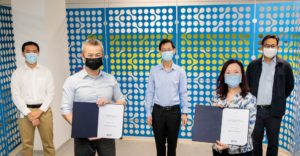Aug. 2, 2021 — The National University of Singapore (NUS) has signed a Memorandum of Understanding (MoU) with Amazon Web Services (AWS) for a collaboration to boost the development of quantum communication and computing technologies, and explore potential industry applications of quantum capabilities.
Quantum computing has the potential to solve computational problems that are beyond the reach of classical computers by harnessing the laws of quantum mechanics to build more powerful tools for processing information. Developing quantum algorithms and designing useful quantum applications require new skills and potentially radically different approaches. Quantum communication offers encryption resistant to computational hacks and new possibilities in networking.
The collaboration is led by the Quantum Engineering Programme (QEP), a national initiative launched in 2018 by the National Research Foundation, Singapore (NRF), which aims to leverage quantum technologies to solve real-world problems. The programme is hosted by NUS.
Under the MoU, AWS will support QEP in the development of quantum computing research and projects, and connect to the National Quantum-Safe Network for quantum communications. Both areas include the identification of use cases and development of applications that could support future commercialisation of Singapore-designed quantum computing and communication technologies, and the joint organisation of academic, scientific, and public outreach activities like seminars, workshops, festivals, and conferences.

Professor Chen Tsuhan, NUS Deputy President (Research & Technology), said, “Singapore’s journey to becoming a knowledge-based economy requires a right mix of world-class talent, cutting-edge infrastructure, and a well-established knowledge transfer ecosystem. A cornerstone of this vision is the QEP hosted at NUS, which brings together expertise in quantum science and engineering, and aims to translate radical innovations into commercialisable solutions. This collaboration between QEP and AWS is a crucial enabler for the nation’s full digital transformation and opens the door to a quantum-ready future.”
Quantum technologies have been identified as a key technology area under the Research, Innovation and Enterprise (RIE) 2025 Plan, which NRF manages. The collaboration between QEP and AWS will accelerate the development of innovations and solutions in this field.
Mr Ling Keok Tong, Director (Smart Nation and Digital Economy) at NRF, said, “Through our early and steady investments over the last 20 years, Singapore has developed world-class capabilities in quantum technologies. We intend to collaborate with AWS to bring these technologies to fruition through actual products and services, and continue to spur our local research ecosystem to push the envelope in developing capabilities and technologies that are of interest to the industry.”
“Singapore has built its quantum technology expertise over many years. AWS is delighted to collaborate with QEP to accelerate the quantum innovation in Singapore working directly with researchers, developers, governments, and organisations,” said Ms Tan Lee Chew, ASEAN Managing Director, Worldwide Public Sector, AWS. “We are committed to making quantum technology accessible to any customer to experiment and explore the technology’s potential to develop industry-focused solutions that solve meaningful customer challenges.”
Synergistic collaboration
QEP and AWS forged the collaboration on a common goal of growing capabilities in the quantum community.
Since its establishment, QEP has supported eight major research projects to further the development of quantum technologies. New projects include exploring more powerful hardware and software solutions for quantum computers (which could eventually outperform today’s supercomputers) for commercial tasks like optimising delivery routes for goods, simulating chemicals to help design drugs, or making manufacturing more efficient. These solutions could become a reality when larger, more advanced quantum computers become available. Meanwhile, the National Quantum-Safe Network will see the integration of highly secure quantum communication systems into local fibre networks.
QEP also nurtures opportunities that involve local and international companies in Singapore’s vibrant innovation ecosystem.
AWS supports democratised access to quantum computing through Amazon Braket, a fully managed quantum computing service that helps researchers and developers get started with the technology to accelerate research and discovery. Amazon Braket provides access to three types of quantum hardware, including quantum annealers and gate-based systems built on superconducting qubits and on trapped ions, as well as tools to run hybrid quantum and classical algorithms. Amazon Braket’s cross-platform developer tools provide a consistent experience so users do not need to learn multiple development environments, making it easy to explore which quantum computing technology is the best fit for an application.
“QEP is preparing Singapore to be a hub for innovation in quantum devices and services, and making this a success will require combining efforts with industry”, said Associate Professor Alexander Ling, Director of the QEP. “We are delighted that AWS is bringing its breadth and depth of cloud technologies to support this shared vision. We look forward to seeing the outcomes of this collaboration,” added Assoc Prof Ling, who is also from the NUS Department of Physics, and is a Principal Investigator at the Centre for Quantum Technologies.
Source: National University of Singapore




























































